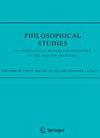反对奇点假说
IF 1.1
1区 哲学
0 PHILOSOPHY
引用次数: 0
摘要
奇点假说是一种关于人工智能未来的假说,在这种假说的基础上,自我完善的人工代理将迅速变得比普通人更智能。尽管奇点假说的主张雄心勃勃,但著名哲学家和人工智能研究人员还是不遗余力地为其辩护。在本文中,我将论证奇点假说是建立在缺乏充分支持的增长假设之上的。我展示了奇点假说的主要哲学辩护是如何无法克服怀疑论的。最后,我将从哲学和政策角度阐述这一讨论的意义。本文章由计算机程序翻译,如有差异,请以英文原文为准。

Against the singularity hypothesis
The singularity hypothesis is a hypothesis about the future of artificial intelligence on which self-improving artificial agents will quickly become orders of magnitude more intelligent than the average human. Despite the ambitiousness of its claims, the singularity hypothesis has been defended at length by leading philosophers and artificial intelligence researchers. In this paper, I argue that the singularity hypothesis rests on undersupported growth assumptions. I show how leading philosophical defenses of the singularity hypothesis fail to overcome the case for skepticism. I conclude by drawing out philosophical and policy implications of this discussion.
求助全文
通过发布文献求助,成功后即可免费获取论文全文。
去求助
来源期刊

PHILOSOPHICAL STUDIES
PHILOSOPHY-
CiteScore
2.60
自引率
7.70%
发文量
127
期刊介绍:
Philosophical Studies was founded in 1950 by Herbert Feigl and Wilfrid Sellars to provide a periodical dedicated to work in analytic philosophy. The journal remains devoted to the publication of papers in exclusively analytic philosophy. Papers applying formal techniques to philosophical problems are welcome. The principal aim is to publish articles that are models of clarity and precision in dealing with significant philosophical issues. It is intended that readers of the journal will be kept abreast of the central issues and problems of contemporary analytic philosophy.
Double-blind review procedure
The journal follows a double-blind reviewing procedure. Authors are therefore requested to place their name and affiliation on a separate page. Self-identifying citations and references in the article text should either be avoided or left blank when manuscripts are first submitted. Authors are responsible for reinserting self-identifying citations and references when manuscripts are prepared for final submission.
 求助内容:
求助内容: 应助结果提醒方式:
应助结果提醒方式:


